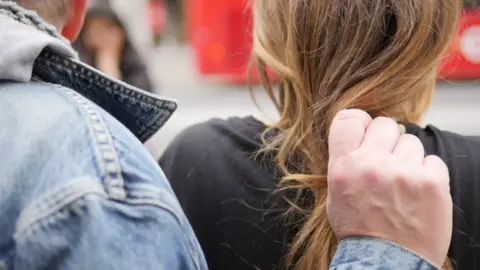Modern Slavery: Cardiff listed as 'hotspot' by Salvation Army
 Salvation Army
Salvation ArmyA charity has seen a 43% rise in the number of slavery victims referred from Wales for specialist help in the past year.
The Salvation Army helped 106 victims in the 12 months to June, but fears a drop in referrals during the first three months of lockdown meant many more cases remained hidden.
Cardiff was highlighted as a "hotspot" with 48 cases.
South Wales Police said: "One victim of slavery is one too many."
There are also concerns the pandemic will have a knock-on effect.
"As we face the biggest economic downturn in recent years, we anticipate the fallout from the pandemic will leave many more people in poverty and at risk of exploitation," said the charity's Major Kathy Betteridge.
"The reduction in the number of referrals to The Salvation Army during the first three months of lockdown greatly concerns us.
"This suggests people who might have been identified have become even more hidden. We believe many are still in the living nightmare of slavery without knowing how to get help."
Forced labour was the most common problem listed by The Salvation Army between July 2019 and June 2020, with 52 cases, including people made to work in restaurants, car washes and factories.
There were also 28 cases of sexual exploitation, 13 of criminal exploitation and 11 of domestic servitude among the others.
The Salvation Army said 75% of victims were 40 or under and were mainly from the UK and other European countries.
A spokesman said anybody could come into contact with a victim without realising and there were tell-tale signs, such as people appearing uneasy, unkempt, malnourished or injured.
There are other less obvious signs, such as other people paying for their travel or speaking for them.
A high-profile case from 2016 involved Michael Hughes, who moved to Wales in 1988 in search of a better life.
Instead he found himself "bought", confined to a garden shed and forced into hard labour for two decades as a modern slave.
 Salvation Army
Salvation ArmyMr Hughes was made to graft for Patrick Joseph Connors' tarmacking and building firm, working punishing hours for less than £10 a day or just tobacco and alcohol.
Four men from Cardiff were later jailed for between two-and-a-half and 14 years for charges such as kidnap and forced labour.
"It was quite horrific what he had to go through," said Ch Supt Paul Griffiths, of Gwent Police, at the end of the case.
Investigations by police this year have centred around care homes.
Also, a food processing and packaging company alerted the police over the supply of a temporary worker.
South Wales Police said: "As a force, our concern over hidden harms, including modern slavery, abuse and ill-treatment of vulnerable individuals, increased during the Covid-19 crisis.
"We have taken every opportunity, alongside our police and crime commissioner, to educate the public on how to spot the signs, to encourage victims to come forward and to signpost sufferers towards help and support services."
A spokeswoman said the rise in reported cases could be attributed to an increased awareness of the problem, which was "encouraging".
